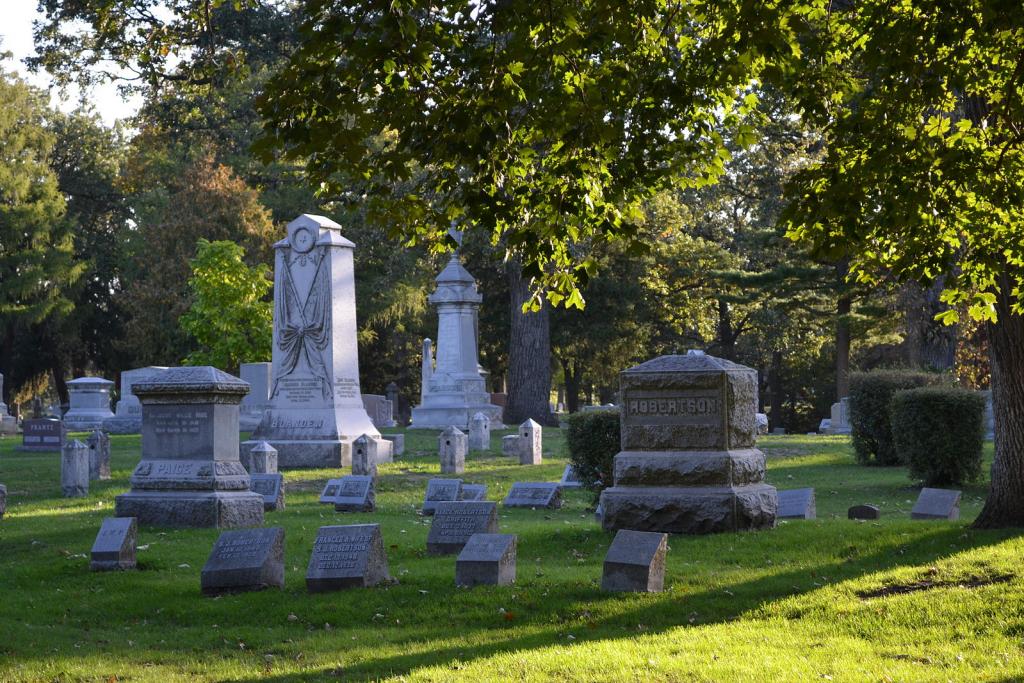
Curiously, being in Chicago, I’ve begun to think of the most famous adopted son of Illinois, Abraham Lincoln. Many years ago, with her parents, my wife and I visited parts of the state associated with him. One of those places was the Oakland Cemetery in Petersburg, where Ann Rutledge, who died at the age of 22 of typhoid, is buried.
According to some, although this is disputed by others, she was Abraham Lincoln’s first and deepest love.
Long after she died, a granite monument was placed atop her grave, bearing a poem from the famous 1915 Spoon River Anthology of Edgar Lee Masters:
Out of me unworthy and unknown
The vibrations of deathless music:
“With malice toward none, with charity toward all.”
Out of me the forgiveness of millions toward millions,
And the beneficent face of a nation
Shining with justice and truth.
I am Ann Rutledge who sleeps beneath these weeds,
Beloved in life of Abraham Lincoln,
Wedded to him, not through union,
But through separation.
Bloom forever, O Republic,
From the dust of my bosom!
I first read (and was deeply moved by) that poem and the rest of the Spoon River Anthology in high school — as I was moved, many years later, by our visit to Oakland Cemetery. I hope, someday, to visit it again.
In the meantime, I’m grateful to John Hancock for calling my attention to a poem entitled “Mortality,” written in 1824 by the Scot William Knox. According to Brother Hancock, Abraham Lincoln memorized the poem and recited it so frequently that some thought he was its author. He is even said to have remarked that “I would give all I am worth, and go in debt, to be able to write so fine a piece as I think that is.” It apparently spoke to the deep melancholy from which he is known to have suffered — and perhaps it also captured an enduring sorrow for Ann Rutledge:
Mortality
By William Knox
Oh! why should the spirit of mortal be proud?
Like a swift-fleeting meteor, a fast-flying cloud
A flash of the lightning, a break of the wave
He passeth from life to his rest in the grave.
The leaves of the oak and the willow shall fade,
Be scattered around, and together be laid;
And the young and the old, and the low and the high,
Shall moulder to dust, and together shall lie.
The infant a mother attended and loved;
The mother that infant’s affection who proved;
The husband, that mother and infant who blest,–
Each, all, are away to their dwellings of rest.
The maid on whose cheek, on whose brow, in whose eye,
Shone beauty and pleasure, — her triumphs are by;
And the memory of those who loved her and praised,
Are alike from the minds of the living erased.
The hand of the king that the sceptre hath borne,
The brow of the priest that the mitre hath worn,
The eye of the sage, and the heart of the brave,
Are hidden and lost in the depths of the grave.
The peasant, whose lot was to sow and to reap,
The herdsman, who climbed with his goats up the steep,
The beggar, who wandered in search of his bread,
Have faded away like the grass that we tread.
The saint, who enjoyed the communion of Heaven,
The sinner, who dared to remain unforgiven,
The wise and the foolish, the guilty and just,
Have quietly mingled their bones in the dust.
So the multitude goes — like the flower or the weed
That withers away to let others succeed;
So the multitude comes — even those we behold,
To repeat every tale that has often been told.
For we are the same our fathers have been;
We see the same sights our fathers have seen;
We drink the same stream, we view the same sun,
And run the same course our fathers have run.
The thoughts we are thinking, our fathers would think;
From the death we are shrinking, our fathers would shrink;
To the life we are clinging, they also would cling; —
But it speeds from us all like a bird on the wing.
They loved — but the story we cannot unfold;
They scorned — but the heart of the haughty is cold;
They grieved — but no wail from their slumber will come;
They joyed — but the tongue of their gladness is dumb.
They died — ay, they died; — we things that are now,
That walk on the turf that lies over their brow,
And make in their dwellings a transient abode;
Meet the things that they met on their pilgrimage road.
Yea! hope and despondency, pleasure and pain,
Are mingled together in sunshine and rain;
And the smile and the tear, the song and the dirge,
Still follow each other, like surge upon surge.
‘Tis the wink of an eye — ’tis the draught of a breath–
From the blossom of health to the paleness of death,
From the gilded saloon to the bier and the shroud:–
Oh! why should the spirit of mortal be proud?
Morbid? Gloomy? Perhaps. But sometimes it’s healthy to remember that we’re mortal, and that all earthly things must pass. And rather quickly, too.
Posted from Chicago, Illinois










